#Ringo starr today
Explore tagged Tumblr posts
Text
Sixty years ago today, John was accused of having red hair




Sound definitely needed for John's voice and laugh...
The Beatles at San Francisco airport, 18th August 1964 - part 1 (part 2)
#for someone who knows jane asher I can understand his confusion#look at ringo's happy face#I wonder if the shower is anything to do with the privacy he and paul had earlier#it was sixty years ago today#john lennon#ringo starr#the beatles#javelin's gifs#javelin's gifs: 1964#javelin's gifs: john#javelin's gifs: fave
839 notes
·
View notes
Text

#fuck that bitch#-john 1970#sad day for all the gays#how do you sleep#the day that mclennon cease to exist#sad post today#the beatles#john lennon#paul mccartney#george harrison#ringo starr#beatles#memes#mclennon
550 notes
·
View notes
Text



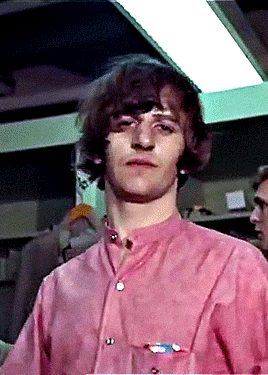
RINGO STARR The Beatles backstage at Shea Stadium
#ringostarredit#beatlesedit#thebeatlesedit#ringo starr#the beatles#beatles#music#*mine#*mygifs#my friend likes to say her bias is ringo so this edit is dedicated to her bc it's her birthday today <3
412 notes
·
View notes
Text
Once upon a time…
JOHN: [Paul] even recorded that all by himself in the other room, that’s how it was getting in those days. We came in and he’d – he’d made the whole record. Him drumming, him playing the piano, him singing. Just because – it was getting to be where he wanted to do it like that, but he couldn’t – couldn’t – maybe he couldn’t make the break from The Beatles, I don’t know what it was…. But we’re all, I’m sure – I can’t speak for George, but I was always hurt when he’d knock something off without… involving us, you know? But that’s just the way it was then.
(August, 1980: interview for Playboy with David Sheff)
‘More than anything,’ he says, ‘I would love the Beatles to be on top of their form and for them to be as productive as they were. But things have changed. … I would have liked to have sung harmony with John, and I think he would have liked me to. But I was too embarrassed to ask him. And I don’t work to the best of my abilities in that situation.’
(Paul McCartney, interview, Evening Standard, April 21-22, 1970)

PAUL: On 'Hey Jude', when we first sat down and I sang 'Hey Jude…', George went 'nanu nanu' on his guitar. I continued, 'Don't make it bad…' and he replied 'nanu nanu'. He was answering every line - and I said, 'Whoa! Wait a minute now. I don't think we want that. Maybe you'd come in with answering lines later. For now I think I should start it simply first.' He was going, 'Oh yeah, OK, fine, fine.' But it was getting a bit like that. He wasn't into what I was saying. In a group it's democratic and he didn't have to listen to me, so I think he got pissed off with me coming on with ideas all the time. I think to his mind it was probably me trying to dominate. It wasn't what I was trying to do - but that was how it seemed. This, for me, was eventually what was going to break The Beatles up. I started to feel it wasn't a good idea to have ideas, whereas in the past I'd always done that in total innocence, even though I was maybe riding roughshod.
youtube
I did want to insist that there shouldn't be an answering guitar phrase in 'Hey Jude' - and that was important to me - but of course if you tell a guitarist that, and he's not as keen on the idea as you are, it looks as if you're knocking him out of the picture. I think George felt that: it was like, 'Since when are you going to tell me what to play? I' in The Beatles too.' So I can see his point of view. But it burned me, and I then couldn't come up with ideas freely, so I started to have to think twice about anything I'd say - 'Wait a minute, is this going to be seen to be pushy?' - whereas in the past it had just been a case of, 'Well, the hell, this would be a good idea. Let's do this song called "Yesterday". It'll be all right.'
( The Beatles Anthology, 2000)
‘There’s no one who’s to blame. We were fools to get ourselves into this situation in the first place. But it’s not a comfortable situation for me to work in as an artist.’
(Paul McCartney, interview, Evening Standard, April 21-22, 1970)
‘It simply became very difficult for me to write with Yoko sitting there. If I had to think of a line I started getting very nervous. I might want to say something like “I love you, girl”, but with Yoko watching I always felt that I had to come out with something clever and avant-garde. She would probably have loved the simple stuff, but I was scared.’ ‘I’m not blaming her, I’m blaming me. You can’t blame John for falling in love with Yoko any more than you can blame me for falling in love with Linda. We tried writing together a few more times, but I think we both decided it would be easier to work separately.’
(Paul McCartney, interview, Evening Standard, April 21-22, 1970)
JOHN: "I was always waiting for a reason to get out of the Beatles from the day I filmed 'How I Won The War' (in 1966). I just didn't have the guts to do it. The seed was planted when the Beatles stopped touring and I couldn't deal with not being onstage. But I was too frightened to step out of the palace."
(John Lennon, Newsweek, September 29, 1980)
PAUL: As far as I was concerned, yeah, I would have liked the Beatles never to have broken up. I wanted to get us back on the road doing small places, then move up to our previous form and then go and play. Just make music, and whatever else there was would be secondary. But it was John who didn’t want to. He had told Allen Klein the new manager he and Yoko had picked late one night that he didn’t want to continue.
(Paul and Linda McCartney, interview for Playboy, December 1984)
PAUL: I must admit we'd known it was coming at some point because of his intense involvement with Yoko. John needed to give space to his and Yoke's thing. Someone like John would want to end The Beatles period and start the Yoko period; and he wouldn't like either to interfere with the other.
(The Beatles Anthology, 2000)
PAUL: I think, largely looking back on it, I think it was mainly John [who] needed a new direction – that he then went into, headlong, helter skelter, you know, he went right in there, doing all sorts of stuff he’d never done before, with Yoko. And you can’t blame him. Because he was that kind of guy, [the kind who] really wanted to live life and do stuff, you know. There was just no holding back with John. And it was what we’d all admired him for. So you couldn’t really say, “Oh, we don’t want you to do that, John. You should just stay with us.” We felt so wimpy, you know. So it had to happen like that.
(Paul McCartney, November, 1983, interview with DJ Roger Scott)
The Beatles split up? It just depends how much we all want to record together. I don’t know if I want to record together again. I go off and on it. I really do. The problem is that in the old days, when we needed an album, Paul and I got together and produced enough songs for it. Nowadays there’s three if us writing prolifically and trying to fit it all onto one album. Or we have to think of a double album every time, which takes six months. That’s the hang-up we have… I don’t want to spend six months making an album I have two tracks on. And neither do Paul or George probably. That’s the problem. If we can overcome that, maybe it’ll sort itself out. None of us want to be background musicians most of the time. It’s a waste. We didn’t spend ten years ‘making it’ to have the freedom in the recording studios, to be able to have two tracks on an album. This is why I’ve started with the Plastic Ono and working with Yoko… to have more outlet. There isn’t enough outlet for me in the Beatles. The Ono Band is my escape valve. And how important that gets, as compared to the Beatles for me, I’ll have to wait and see.
(John Lennon, New Musical Express December 13, 1969)
PLAYBOY: In most of his interviews, John said he never missed the Beatles. Did you believe him? PAUL: I don’t know. My theory is that he didn’t. Someone like John would want to end the Beatle period and start the Yoko period. And he wouldn’t like either to interfere with the other. As he was with Yoko, anything about the Beatles tended inevitably to be an intrusion. So I think he was interested enough in his new life to genuinely not miss us.
(Paul and Linda McCartney, interview for Playboy, December 1984)
Yoko: Paul began complaining that I was sitting too close to them when they were recording, and that I should be in the background. John: Paul was always gently coming up to Yoko and saying: "Why don't you keep in the background a bit more?" I didn't know what was going on. It was going on behind my back. Yoko: And I wasn't uttering a word. It wasn't a matter of my being aggressive. It was just the fact that I was sitting near to John. And we stood up to it. We just said, "No. It's simply that we just have to come together." They were trying to discourage me from attending meetings, et cetera. And I was always there. And Linda actually said that she admired that we were doing that. John: Paul even said that to me.
(John Lennon interviewed by Peter McCabe and Robert Schonfeld at the St. Regis Hotel, September 5, 1971)

Paul: They’re onto that thing. They just want to be near to each other. So I just think it’s just silly of me, or of anyone, to try and say to him, “No, you can’t,” you know. It’s like, ‘cause – okay, they’re – they’re going overboard about it, but John always does! And Yoko probably always does. So that’s their scene. You can’t go saying – you know, “Don’t go overboard about this thing. Be sensible about it. Don’t bring it to meetings.” It’s his decision, that. It’s – it’s none of our business, to start interfering in that. Even when it comes into our business, you still can’t really say much, unless – except, “Look, I don’t like it, John.” And then he can say, well, “Screw you,” or, “I like it,” or, “Well, I won’t do it so much,” or blablabla. Like, that’s the only way, you know. To tell John about that. Michael Lindsay-Hogg: Have you done that already? Paul: Well, I told him I didn’t like writing songs… with him and Yoko. Michael Lindsay-Hogg: Were you writing much more before she came around—? Paul: Oh yeah, sure. Michael Lindsay-Hogg: Or had you – cooled it a bit, then? Before her. Ringo: Before Yoko got there. Paul: Yeah, cooled it, cooled it. Sure. We’d cooled it because… not playing together. Ever since we didn’t play together… Michael Lindsay-Hogg: Onstage, you mean? Paul: Yes. With the band. Because we lived together, and we played together. We were in the same hotel, up at the same time every morning, doing this all day. And this – I mean, this, you know, it doesn’t matter what you do, [but] just as long as you’re this close all day, something grows, you know. In some ways. And when you’re not this close, only, just physically… something goes. Michael Lindsay-Hogg: Right. Paul: So then you can come together to record, and stuff, but you still sort of lose the… Actually, musically, you know, we really – we can play better than we’ve ever been able to play, you know. Like, I really think that. I think, like – we’re – we’re alright on that. It’s just that – being together thing, you know.
(Paul McCartney, Get Back sessions, 13 January, 1969)
What actually happened was, the group was getting very tense, it was looking like we were breaking up. One day, I came in and we had a meeting, and it was all Apple and business and Allen Klein, and it was getting very hairy, and no one was realy enjoying themselves. It was – we’d forgotten the music bit. It was just business. I came in one day and I said, “I think we should get back on the road, a bit like what you and I were talking about before, small band, go and do the clubs, sod it. Let’s get back to square one, let’s remember what we’re all about. Let’s get back.” And John’s actual words were, “I think you’re daft. And I wasn’t gonna tell you, but – we’re breaking the group up. I’m breaking the group up. It feels good. It feels like a divorce.” And he just sort of sat there, and all our jaws dropped.
(Paul McCartney, November, 1983, interview with DJ Roger Scott)
Wenner: You said you quit the Beatles first. John: Yes. Wenner: How? John: I said to Paul “I’m leaving.” John: I knew on the flight over to Toronto or before we went to Toronto: I told Allen I was leaving, I told Eric Clapton and Klaus that I was leaving then, but that I would probably like to use them as a group. I hadn’t decided how to do it – to have a permanent new group or what – then later on, I thought fuck, I’m not going to get stuck with another set of people, whoever they are. I announced it to myself and the people around me on the way to Toronto a few days before. And on the plane – Klein came with me – I told Allen, “It’s over.” When I got back, there were a few meetings, and Allen said well, cool it, cool it, there was a lot to do, businesswise you know, and it would not have been suitable at the time. Then we were discussing something in the office with Paul, and Paul said something or other about the Beatles doing something, and I kept saying “No, no, no” to everything he said. So it came to a point where I had to say something, of course, and Paul said, “What do you mean?” I said, “I mean the group is over, I’m leaving.” … So that’s what happened. So, like anybody when you say divorce, their face goes all sorts of colors. It’s like he knew really that this was the final thing…
(John Lennon, December 1970, interview with Jann Wenner for Rolling Stone)

PAUL: But what wasn't too clever was this idea of: 'I wasn't going to tell you till after we signed the new contract.' Good old John – he had to blurt it out. And that was it. There's not a lot you can say to, 'I'm leaving the group,' from a key member. I didn't really know what to say. We had to react to him doing it; he had control of the situation.
(The Beatles Anthology, 2000)
Allen was there, and he will remember exactly and Yoko will, but this is exactly how I see it. Allen was saying don’t tell. He didn’t want me to tell Paul even. So I said, “It’s out,” I couldn’t stop it, it came out. Paul and Allen both said that they were glad that I wasn’t going to announce it, that I wasn’t going to make an event out of it. I don’t know whether Paul said “Don’t tell anybody,” but he was darned pleased that I wasn’t going to. He said, “Oh, that means nothing really happened if you’re not going to say anything.”
(John Lennon, December 1970, interview with Jann Wenner for Rolling Stone)
And – that was it, really. And nobody quite knew what to say, and we sort of then, after that statement, we then thought, “Well… give it a couple of months. We may decide. I mean, it’s a little bit of a big act, to just break up like that. Let’s give it a couple of months. We might all just come back together.” And we talked for a couple of months, but it just was never going to be on.
(Paul McCartney, November, 1983, interview with DJ Roger Scott)

Postcard from John and Yoko to Paul from Danmark January 1970
John: George was on the session for Instant Karma, Ringo’s away and Paul’s – I dunno what he’s doing at the moment, I haven’t a clue. Interviewer: When did you last see him? John: Uh, before Toronto. I’ll see him this week actually, yeah. If you’re listening, I’m coming round.
(John Lennon interview 6th February, 1970)
Interviewer: What about the Beatles all together as a group? John: …You can’t pin me down because I haven’t got- there’s no- it’s completely open, whether we do it or not. Life is like that, whether I make another Plastic Ono album or Lennon album or anything is open you know, I don’t like to prejudge it. And I have no idea if the Beatles are working together again or not, I never did have, it was always open. If someone didn’t feel like it, that’s it. And maybe if one of us starts it off, the others will all come round and make an album you know.
(John Lennon interview 6th February, 1970)
Interviewer: Why do you think he [Paul] has lost interest in Apple? John: That’s what I want to ask him! We had a heavy scene last year as far as business was concerned and Paul got a bit fed-up with all the effort of business. I think that’s all it is. I hope so.
(John Lennon interviewed by Roy Shipston for Disc and Music Echo, February 28, 1970)
‘Anyway, I hung on for all these months wondering whether the Beatles would ever come back together again…and let’s face it I’ve been as vague as anyone, hoping that John might come around and say, “All right lads, I’m ready to go back to work…”
(Paul McCartney, interview, Evening Standard, April 21-22, 1970)
PAUL: For about three or four months, George, Ringo and I rang each other to ask: 'Well, is this it then?' It wasn't that the record company had dumped us. It was still a case of: we might get back together again. Nobody quite knew if it was just one of John's little flings, and that maybe he was going to feel the pinch in a week's time and say, 'I was only kidding.' I think John did kind of leave the door open. He'd said: 'I'm pretty much leaving the group, but…' So we held on to that thread for a few months, and then eventually we realised, 'Oh well, we're not in the band any more. That's it. It's definitely over.'
(The Beatles Anthology, 2000)
PAUL: I started thinking, 'Well, if that's the case, I had better get myself together. I can't just let John control the situation and dump us as if we're the jilted girlfriends.'
(The Beatles Anthology, 2000)
‘John’s in love with Yoko, and he’s no longer in love with the other three of us. And let’s face it, we were in love with the Beatles as much as anyone. We’re still like brothers and we have enormous emotional ties because we were the only four that it all happened to…who went right through those ten years. I think the other three are the most honest, sincere men I have ever met. I love them. I really do.’ ‘I don’t mind being bound to them as a friend. I like that idea. I don’t mind being bound to them musically, because I like the others as musical partners. I like being in their band. But for my own sanity, we must change the business arrangements we have…’
(Paul McCartney, interview, Evening Standard, April 21-22, 1970)
‘Last year John said he wanted a divorce. All right, so do I. I want to give him that divorce. I hate this trial separation because it’s just not working. Personally, I don’t think John could do the Beatles thing now. I don’t think it would be good for him.’
(Paul McCartney, interview, Evening Standard, April 21-22, 1970)

‘I told John on the phone the other day that at the beginning of last year I was annoyed with him. I was jealous because of Yoko, and afraid about the break-up of a great musical partnership. It’s taken me a year to realise that they were in love. Just like Linda and me.’
(Paul McCartney, interview, Evening Standard, April 21-22, 1970)
John: Well, Paul rang me up. He didn't actually tell me he'd split, he said he was putting out an album [McCartney]. He said, "I'm now doing what you and Yoko were doing last year. I understand what you were doing." All that shit. So I said, "Good luck to yer."
(John Lennon interviewed by Peter McCabe and Robert Schonfeld at the St. Regis Hotel, September 5, 1971)
I think he claims that he didn’t mean that to happen but that’s bullshit. He called me in the afternoon of that day and said, “I’m doing what you and Yoko were doing last year.” I said good, you know, because that time last year they were all looking at Yoko and me as if we were strange trying to make our life together instead of being fab, fat myths. So he rang me up that day and said I’m doing what you and Yoko are doing, I’m putting out an album, and I’m leaving the group too, he said. I said good. I was feeling a little strange, because he was saying it this time, although it was a year later, and I said “good,” because he was the one that wanted the Beatles most, and then the midnight papers came out.
(John Lennon, December 1970, interview with Jann Wenner for Rolling Stone)
Q: "Why did you decide to make a solo album?" PAUL: "Because I got a Studer four-track recording machine at home - practiced on it (playing all instruments) - liked the results, and decided to make it into an album." Q: "Were you influenced by John's adventures with the Plastic Ono Band, and Ringo's solo LP?" PAUL: "Sort of, but not really." Q: "Are all songs by Paul McCartney alone?" PAUL: "Yes sir." Q: "Will they be so credited: McCartney?" PAUL: "It's a bit daft for them to be Lennon/McCartney credited, so 'McCartney' it is." Q: "Did you enjoy working as a solo?" PAUL: "Very much. I only had me to ask for a decision, and I agreed with me. Remember Linda's on it too, so it's really a double act." … Q: "What has recording alone taught you?" PAUL: "That to make your own decisions about what you do is easy, and playing with yourself is very difficult, but satisfying." … Q: "Is this album a rest away from the Beatles or the start of a solo career?" PAUL: "Time will tell. Being a solo album means it's 'the start of a solo career…' and not being done with the Beatles means it's just a rest. So it's both." Q: "Is your break with the Beatles temporary or permanent, due to personal differences or musical ones?" PAUL: "Personal differences, business differences, musical differences, but most of all because I have a better time with my family. Temporary or permanent? I don't really know." Q: "Do you foresee a time when Lennon-McCartney becomes an active songwriting partnership again?" PAUL: "No." Q: "What do you feel about John's peace effort? The Plastic Ono Band? Giving back the MBE? Yoko's influence? Yoko?" PAUL: "I love John, and respect what he does - it doesn't really give me any pleasure." … Q: "What are your plans now? A holiday? A musical? A movie? Retirement?" PAUL: "My only plan is to grow up!"
(Paul McCartney, April 9th 1970, press release 'McCartney')
SCOTT: Did you not realize that this was going to happen to you after you’d been the one to actually do it, and say, “Right, that’s it”? PAUL: No – it’s – wrong. Wrong. Sorry. It wasn’t me, it was John. SCOTT: Well, he said it first, but he said it quietly, he didn’t let everybody know. PAUL: No no no no, but the point – what I’m talking about is, see, this is – see, I love this legend stuff, god, you know, you have to actually live with this stuff…
(Paul McCartney, November, 1983, interview with DJ Roger Scott)
Int: I asked Lee Eastman for his view of the split, and what it was that prompted Paul to file suit to dissolve the Beatles' partnership, and he said it was because John asked for a divorce. John Lennon: Because I asked for a divorce? That's a childish reason for going into court, isn't it?
(John Lennon interviewed by Peter McCabe and Robert Schonfeld at the St. Regis Hotel, September 5, 1971)
"And I've changed. The funny thing about it is that I think alot of my change has been helped by John Lennon. I sort of picked up on his lead. John had said, 'Look, I don't want to be that anymore. I'm going to be this.' And I thought, 'That's great.' I liked the fact he'd done it, and so I'll do it with my thing. He's given the okay. In England, if a partnership isn't rolling along and working -- like a marriage that isn't working-- then you have reasonable grounds to break it off. It's great! Good old British justice!
(Paul McCartney, Life Magazine, April 16, 1971)
‘… So, as a natural turn of events from looking for something to do, I found that I was enjoying working alone as much as I’d enjoyed the early days of the Beatles. I haven’t really enjoyed the Beatles in the last two years.’
(Paul McCartney, interview, Evening Standard, April 21-22, 1970)
'Eventually,' McCartney recalled, 'I went and said, "I want to leave. You can all get on with Klein and everything, just let me out." Having not spoken to Lennon for several weeks, he sent him a letter that summer, pleading that the former partners 'let each other out of the trap'. As McCartney testified, Lennon 'replied with a photograph of himself and Yoko, with a balloon coming out of his mouth in which was written, "How and Why?" I replied by letter saying, "How by signing a paper which says we hereby dissolve our partnership. Why because there is no partnership." John replied on a card which said, "Get well soon. Get the other signatures and I will think about it.” Communication was at an end.’
(Peter Doggett, You Never Give Me Your Money, 2009 - P.88)
John phoned me once to try and get the Beatles back together again, after we’d broken up. And I wasn’t for it, because I thought that we’d come too far and I was too deeply hurt by it all. I thought, “Nah, what’ll happen is that we’ll get together for another three days and all hell will break loose again. Maybe we just should leave it alone.”
(Paul McCartney, November 1995 Club Sandwich interview)
Int.: … What else was Klein doing to try and lure Paul back? John Lennon: [laughs] One of his reasons for trying to get Paul back was that Paul would have forfeited his right to split by joining us again. We tried to con him into recording with us too. Allen came up with this plan. He said, "Just ring Paul and say, 'We're recording next Friday, are you coming?' " So it nearly happened. It got around that the Beatles were getting together again, because EMI heard that the Beatles had booked recording time again. But Paul would never, never do it, for anything, and now I would never do it.
(John Lennon interviewed by Peter McCabe and Robert Schonfeld at the St. Regis Hotel, September 5, 1971)
There’s no hard feelings or anything, but you just don’t hang around with your ex-wife. We’ve completely finished. ’Cos, you know, I’m just not that keen on John after all he’s done. I mean, you can be friendly with someone, and they can shit on you, and you’re just a fool if you keep friends with them. I’m not just going to lie down and let him shit on me again. I think he’s a bit daft, to tell you the truth. I talked to him about the Klein thing, and he’s so misinformed it’s ridiculous.
(Paul McCartney interviewed by student journalist Ian McNulty for the Hull University Torch, May 1972 [From The McCartney Legacy, Volume 1: 1969 – 1973 by Allan Kozinn and Adrian Sinclair, 2022)
JOHN: We’re not – we’re not fighting too much. It’s silly. You know I always remember watching the film with, uh – who was it? Not Rogers and Hammerstein. Those British people that wrote those silly operas years ago, who are they? WIGG: Gilbert and Sullivan? JOHN: Yeah, Gilbert and Sullivan. I always remember watching the film with Robert Morley and thinking, “We’ll never get to that.” [pause] And we did, which really upset me. But I never really thought we’d be so stupid. But we did. WIGG: What, like splitting like they did? JOHN: Like splitting and arguing, you know, and then they come back, and one’s in a wheelchair twenty years later— YOKO: [laughs] Yes, yes. JOHN: —and all that. [laughs; bleak] I never thought we’d come to that, because I didn’t think we were that stupid. But we were naive enough to let people come between us. And I think that’s what happened. [pause] But it was happening anyway. I don’t mean Yoko, I mean businessmen, you know. All of them. WIGG: What, do you think they were – do you think businessmen were responsible for the breakup? JOHN: Well, no, it’s like anything. When people decide to get divorced, you know, you just – quite often you decide amicably. But then when you get your lawyers and they say, “Don’t talk to the other party unless there’s another lawyer present,” then that’s when the drift really starts happening, and then when you can’t speak to each other without a lawyer, then there’s no communication. And it’s really lawyers that make… divorces nasty. You know, if there was a nice ceremony like getting married, for divorce, then it would be much better. Even divorce of business partners. Because it wouldn’t be so nasty. But it always gets nasty because you’re never allowed to speak your own mind, you have to talk in double-dutch, you have to spend all your time with a lawyer, and you get frustrated, and you end up saying and doing things that you wouldn’t really do under normal circumstances.
(John Lennon, Yoko Ono, October, 1971, St Regis Hotel, New York, interview with David Wigg)
Q: "If you got, I don't know what the right phrase is… 'back together' now, what would be the nature of it?" JOHN: "Well, it's like saying, if you were back in your mother's womb… I don't fucking know. What can I answer? It will never happen, so there's no use contemplating it. Even is I became friends with Paul again, I'd never write with him again. There's no point. I write with Yoko because she's in the same room with me." YOKO: "And we're living together." JOHN: "So it's natural. I was living with Paul then, so I wrote with him. It's whoever you're living with. He writes with Linda. He's living with her. It's just natural."
(John Lennon, Yoko Ono, St. Regis Hotel, New York, September 5th, 1971, interview with Peter McCabe and Robert Schonfeld)
'Dear Mailbag, In order to put out of its misery the limping dog of a news story which has been dragging itself across your pages for the past year, my answer to the question, “Will The Beatles get together again?” … is no.’
(Paul McCartney, Melody Maker, August 29, 1970)

‘Just tell the people I’ve found someone I like enough to want to spend all my time with. That’s me…the home, the kids and the fireplace.’
(Paul McCartney, interview, Evening Standard, April 21-22, 1970)

+ this
+ this
+ this
+ this
#accidental divorce#thanks god for The Beach Boys particularly for Here Today otherwise I wouldn't went through this#the beatles#john lennon#paul mccartney#george harrison#ringo starr#interview: paul#interview: john#yoko ono#john and paul#Youtube
189 notes
·
View notes
Text

THE BEATLES posing with chicks. From "Fabulous" Magazine. 1965. (x)
#best to post this today for easter hehehe#this is the best quality i've seen this pic in#thank you kind person for scanning and posting this!#the beatles#john lennon#paul mccartney#george harrison#ringo starr#1960s#60s#1965#non edits#also just realized my caption is funny :p
366 notes
·
View notes
Text
One of the many reasons to why George is my favourite musician and artist is the fact that even when he was raised in a small town with many closed thoughts he didn't let that or even the fame construct a image of him as utterly masculine and stereotypical, with his friends (different from Paul) for him showing love to everyone being physically close to them or hugging them no matter the gender, was something normal, a simple act of love.
Just like Olivia once said, George had romantic relationships with all of his friends because he was so full of it that it didn't scared him to show it, being making presents or just giving a hug, he did not let the fragile masculinity and conservative speech stop him from being himself.
And that, for a man raised in the late 50s is something to admire
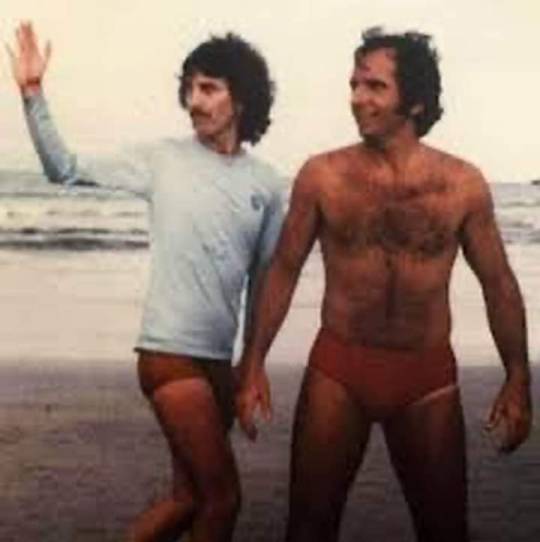
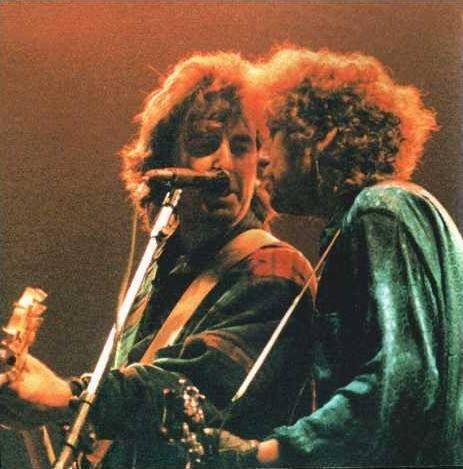
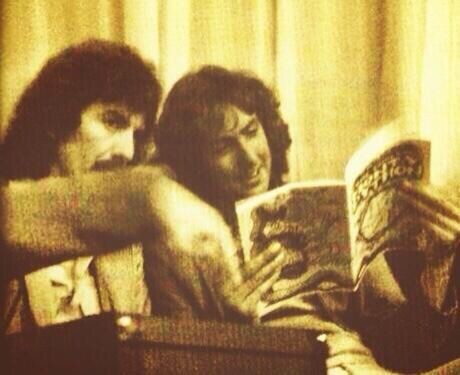
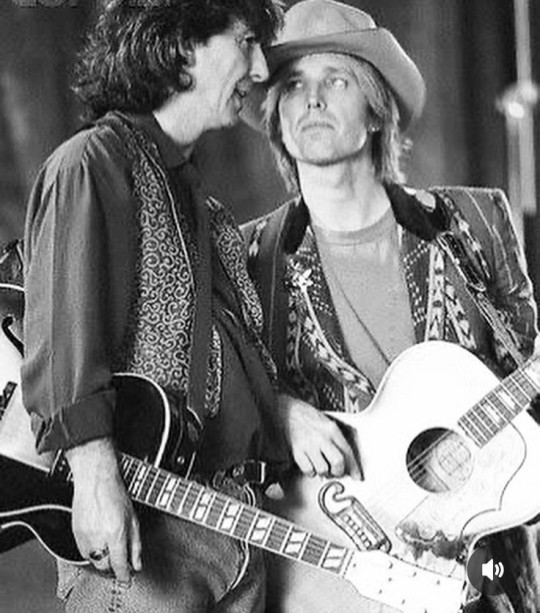
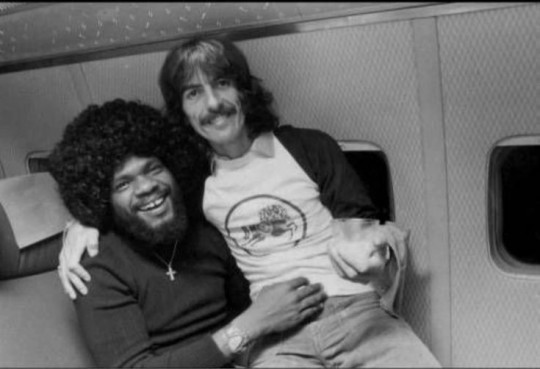
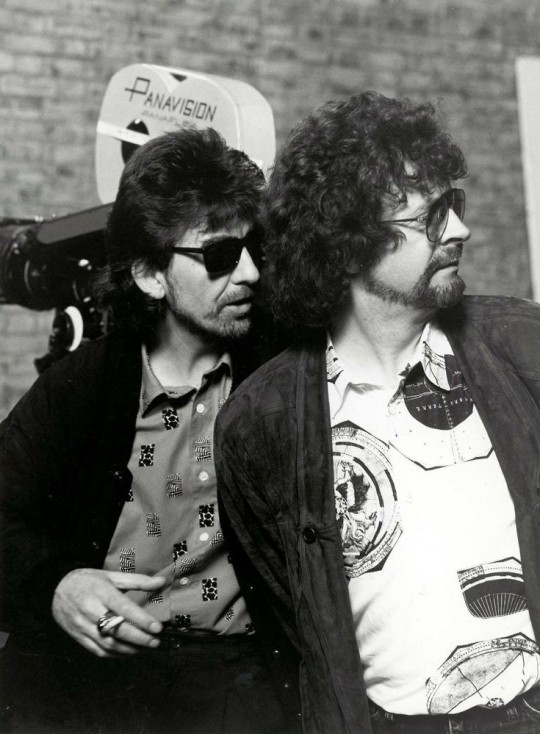
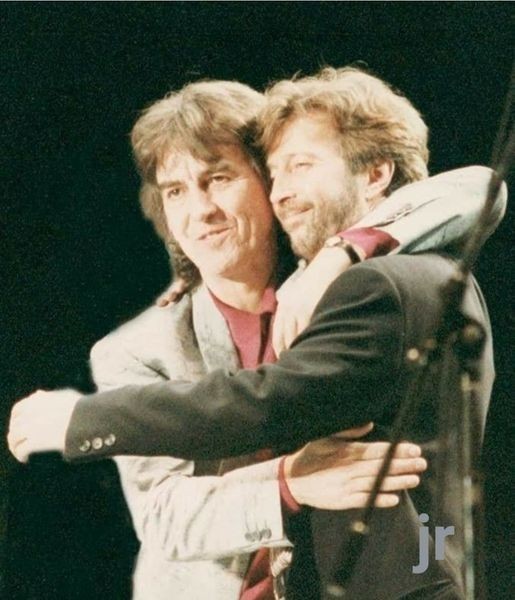
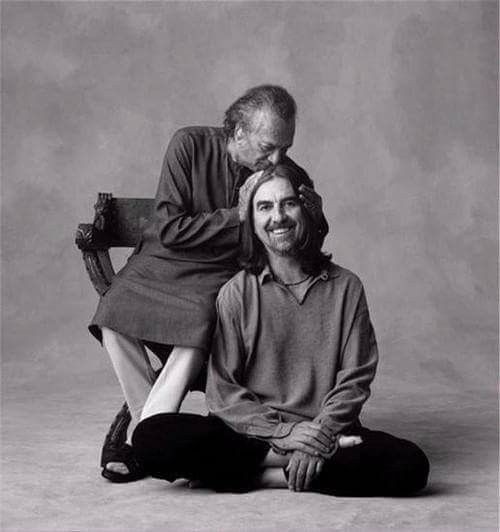
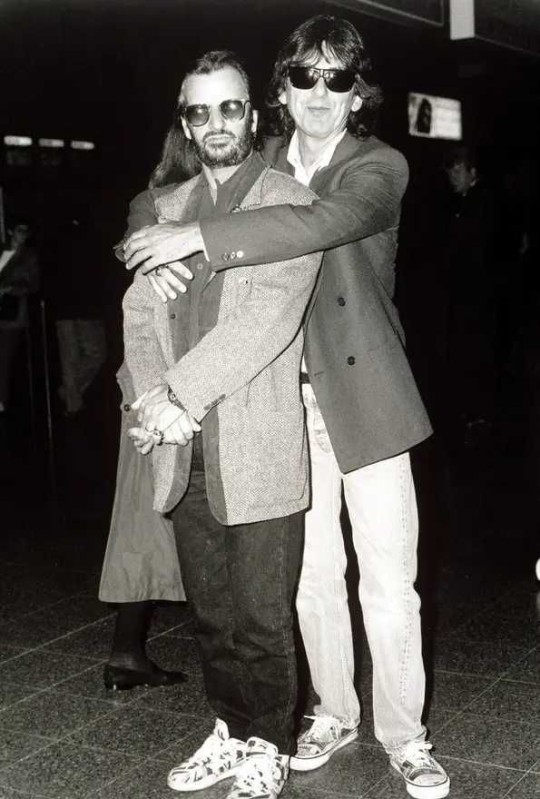
#George Harrison#the traveling wilburys#The Beatles#dark horse tour#Bob dylan#eric idle#tom petty#billy preston#jeff lynne#eric clapton#ravi shankar#Ringo starr#I did not find photos of him after the break of the Beatles being so close to Paul and John#That's why they are not there#I wanted to show how after the break up of the band he liberated himself from the beatle character#Let him show who he was and how much love he had to offer#of course#He was always like that#But I think that the public image of the Beatles just show them as the stereotype of a man#A girls man that was to strong to show fellings to other men#Even if they were platonic#And leaving the band let him break that character and just being George#Who love to shared his love with his friends and that is at today one of the most beloved artist remember#Nelson wilbury#hare krishna
83 notes
·
View notes
Text
#polls#the beatles#john lennon#paul mccartney#george harrison#ringo starr#the takes are SPICY today#I feel very tempted to say John#but George also was friends with people who were INCREDIBLY sketchy in ways I'll talk about later#so I don't really know#:/
130 notes
·
View notes
Text
Get Back Rewatch 55 Years On: Day 17
George is so sweet to put so much effort into helping Ringo write his song and to not ask for any kind of writing credit. Do unto others as you would have them do unto you, right? But also, I’d do that for Ringo too if I were him. Ringo deserves it for everything he’s given to that band and the little credit he’s received.

“What am I playing, Richie?” “You’ll be on drooms.” If the Beatles know how to do one thing, it’s be cute.
John, stop talking about Paul’s strong arms, you're embarrassing yourself.
I do have to just include this here. From my Get Back book. I never heard, “was it sexually oriented?” on the nagra reels, but apparently that’s what Peter Jackson’s cleaned-up version gave him, and again, he was like, “hmm. Too gay.”

He’s known Heather for how long? Less than a year, right? But if somebody had showed me just this footage and told me he’d raised her from a newborn, I would not blink an eye. That kind of tired but fond interaction is exactly how a dad plays with his kid. And she’s climbing all over him and bossing him around like he’s never not been in her life. It’s beautiful.
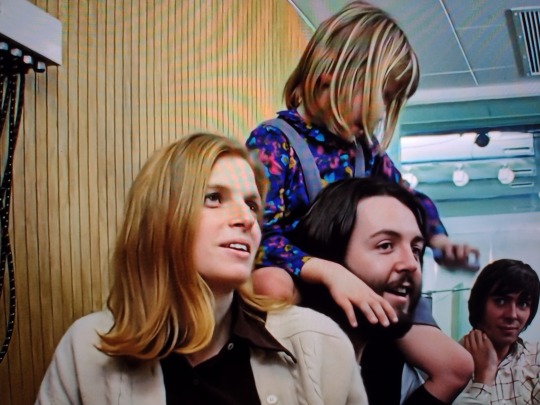

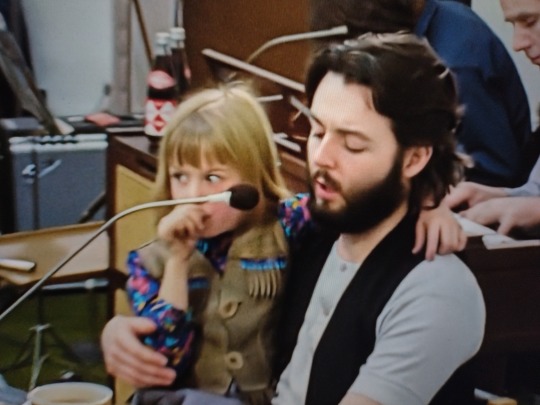
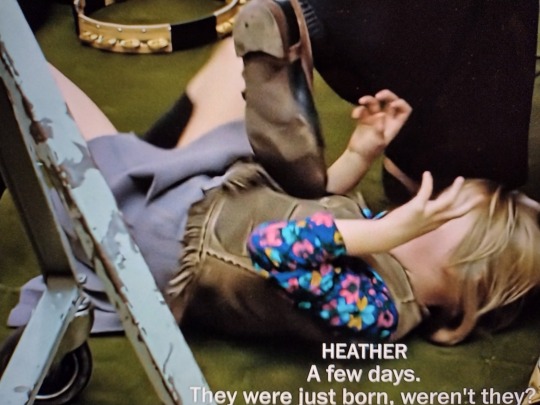
And John, with his “are you going to eat them?” is the perfect sort of bad-example favorite uncle. The kind that would check her out of school when she’s older and go get her ears pierced when her dad had said she was too young.
Sorry, I promise I’m not just going to be thirsting over dad Paul this whole time. I have to just make one thing clear, and this is the only thing I’ll say on the subject and then I’m done. If a man is a 3 and a good dad, he’s a 10. Paul was already an 11, so I’m literally just done-for. Okay, I’ll shut up.
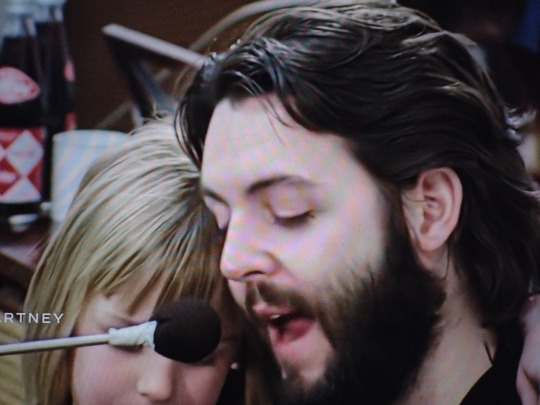
John and Paul doing their usual thing, only paying attention to each other. Talking about an Elvis gospel ending for Let it Be. George, smirking, stands up: and we’ll all kneel as you do it. If John had said it, Paul would be in stitches. But George said it, and he might as well have never opened his mouth for all the notice he gets. And it’s honestly heartbreaking, if you can take your eyes off of the insanity of John and Paul’s weird eye-contact, to watch George’s face go from excited at his own wit and hopeful for a laugh to just completely downcast. Twelve years of that. Twelve years.
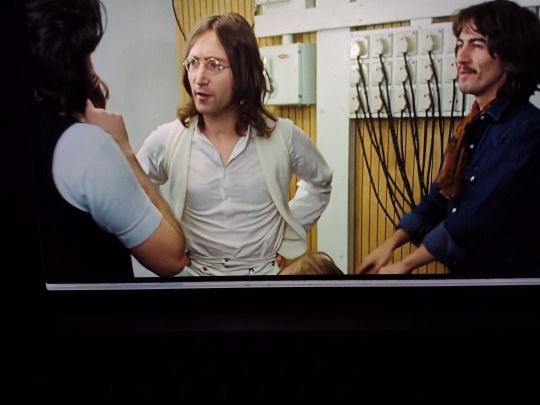
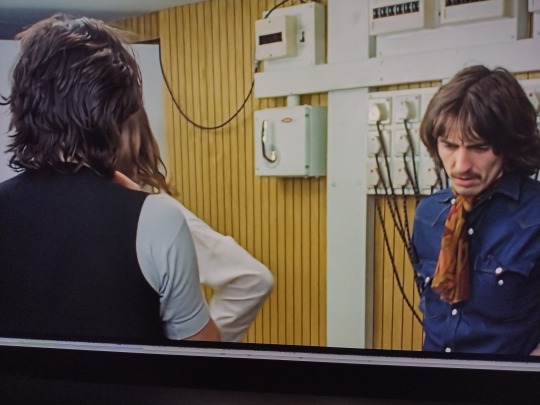
Ringo, you’re an absolute saint. He’s being so sweet to Heather, even letting her mess with his symbols, and then Paul has the audacity to tell him to “keep it lighter.” Like. Paul. Do you think that maybe the fact that he’s got a five-year-old over there “helping” him might have anything to do with how the drums are coming out? Just a thought. Anyone else would at least have something to say about it. Ringo just sort of nods along but he looks SO tired.


TFW you’re inspiring the next generation of women to be loud and free and take up space.
“Dig it” is actually insane to me. I know I’m crazy, but remember those twin dreams they had about buried treasure when they first met? “If you want it, you can dig it up.” ???
When George and Paul just jump into harmonizing together when they’re talking about The Long and Winding Road arrangement? Their voices are like magic together. I wish they would’ve had George sing that part in the final thing, actually.
#that's all for today folks#even later then last time#paul mccartney#the beatles#john lennon#mclennon#ringo starr#george harrison#get back
263 notes
·
View notes
Text

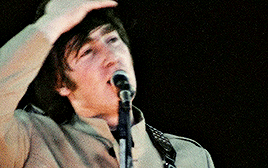


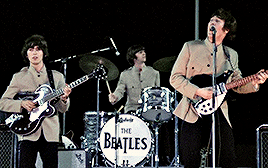



August 15, 1965 — The Beatles perform at Shea Stadium for the first time
#it took me hours to make this lol#i’m not too sure of the coloring but wtvvvv#today in history#the beatles#john lennon#paul mccartney#george harrison#ringo starr#1960s#1965#shea stadium#eight days a week#classic rock#beatlesedit#edit
528 notes
·
View notes
Text



Paul McCartney and George Harrison use their psychic connection to kidnap a man with tinnitus, A Hard Day’s Night (1964)
#sixty years of a hard day’s night#paul mccartney#george harrison#ringo starr#the beatles#a hard day's night#it was sixty years ago today#javelin's gifs#javelin’s gifs: ahdn
604 notes
·
View notes
Text

#haha get it?#because ringo was the oldest#haha#ha#a twitter meme yeah#i have school work to do today so yeah#enjoy#the beatles#paul mccartney#ringo starr#george harrison#john lennon#beatles#memes
82 notes
·
View notes
Text
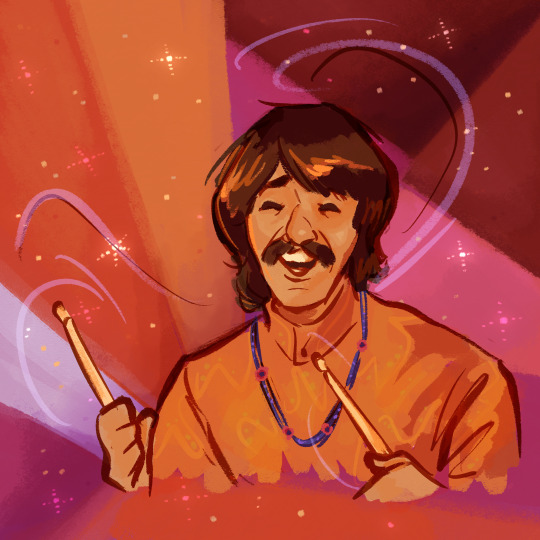
Peace and love, Ringo! 😎✌️☮️🌸🌟🧡🌻🥦💕✨🐙
#I LOVE YOU RITCHIE <3#this sketch & background is from November but I finished it today for ring’s bday#the Beatles#ringo starr
77 notes
·
View notes
Text
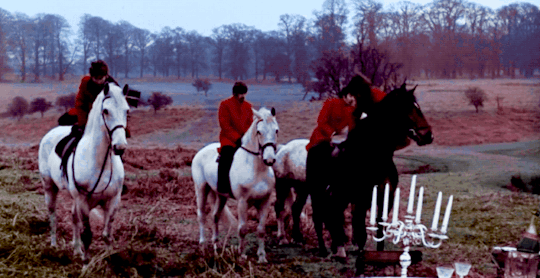


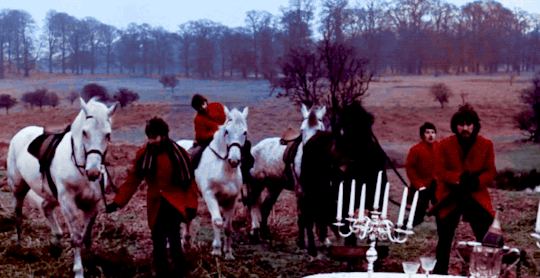

remember when ringo basically died getting off his horse in the penny lane music video
#I DIDNT NOTICE THIS UNTIL TODAY AIEHGILDSKFN#the way that none of them even notice but then paul kinda sees at the end and just keeps skipping along#the beatles#mine#john lennon#george harrison#paul mccartney#ringo starr#george also almost dies too actually like he FLUNG himself off alfhsiafjdhs
537 notes
·
View notes
Text

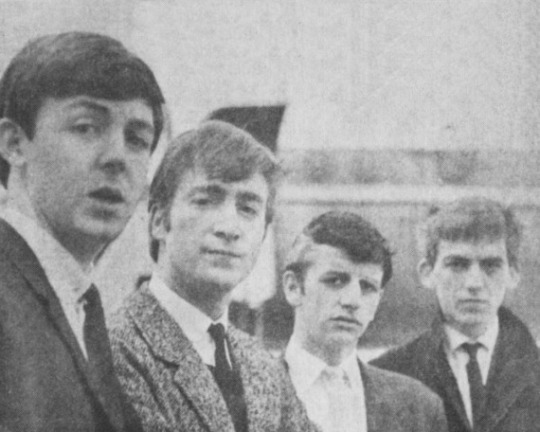
THE BEATLES at Speke Airport (now Liverpool John Lennon Airport) heading to London, 4 September 1962.
#i had never seen that top one before today so i thought i’d share#john at the airport that would later be named after him#the beatles#paul mccartney#john lennon#george harrison#ringo starr#1962#1960s#60s#beatlemania#british invasion
295 notes
·
View notes
Text

THE BEATLES pictured together on stage at the Palladium Theatre during rehearsals for their appearance on SUNDAY NIGHT AT THE LONDON PALLADIUM. October 13, 1963.
#it was 60 years ago today#the beatles#john lennon#paul mccartney#george harrison#ringo starr#1960s#60s#1963#non edits
216 notes
·
View notes
Text
The man who was there the day the Beatles broke up
Mal Evans was the Fab Four’s roadie, fixer and friend. Paul McCartney confided in him when the band split, while John Lennon relied on him to guard his life. A new book tells his story
The Beatles’ lingering tensions finally caught up to them during a meeting among John, Paul and George at 3 Savile Row on September 10 1969. As Mal and Neil [Aspinall, who ran the Beatles’ company Apple Corps] observed, John took particular issue with what he perceived as Paul’s megalomania, saying that, “If you look back on the Beatles albums, good or bad or whatever you think of ’em, you’ll find that most times if anybody has got extra time it’s you! For no other reason than you worked it like that.” For Mal, the conversation must have been pure agony. He idolised Paul, who bore the brunt of the meeting’s vitriol.
In his own defence, Paul protested that he had “tried to allow space on albums for John’s songs, only to find that John hadn’t written any”.
With the idea of recording a new album seemingly off the table, John suggested that they produce a Christmas single instead. After all, he reasoned, their annual holiday fan club record would be due before long. When this idea was met with silence and indifference, John soberly concluded, “I guess that’s the end of the Beatles.”
As horrible as the experience must have been for Mal, panic hadn’t set in just yet. During the past 15 months, Ringo and George had quit the band at various times, only to be coaxed back. But ten days later it all spilled out again at a meeting at Apple. Mal and Allen Klein (their manager after the death of Brian Epstein) were there, along with Yoko, Neil and the boys. For his part, George was on speakerphone from Cheshire, where he was visiting his ailing mother. The topic at hand was a new agreement with Capitol, which Klein was understandably eager to ink.
As Mal observed, Paul began to enumerate the group’s upcoming opportunities, including a series of intimate gigs and a possible television special. In each instance, John said, “No, no, no,” before telling Paul, “Well, I think you’re daft.” Eventually, he blurted out that he wanted a “divorce”. “What do you mean?” a stunned Paul asked. “The group’s over,” John replied. “I’m leaving.”
At this point, Paul recalled, “Everyone blanched except John, who coloured a little, and said, ‘It’s rather exciting. It’s like I remember telling Cynthia I wanted a divorce.’ ”
Afterwards, Mal and Paul returned to McCartney’s home, where they retreated to the garden, still trying to process what had transpired. Paul remained hopeful that John might change his mind, that the Beatles would continue unabated. But Mal knew better. As with George, Mal had reasoned that “all of them had left the group at one time or another, starting with Ringo’’. But when “John came into the office and said, ‘The marriage is over! I want a divorce,’ that was the final thing. That’s what really got to Paul, you know, because I took Paul home and I ended up in the garden crying my eyes out.”
That night with Lennon and Phil Spector in 1973, when happiness was not a warm gun
Mal took great pleasure in spending long hours in John’s company, enjoying the Beatle’s undivided attention, as opposed to sharing him with Paul, George and Ringo. “It was fascinating,” said Mal, who by this point was living in LA and writing his own songs, “because John was talking to me like I was a songwriter, and that was incredible. For the first time, John and I really communicated, whereas, when it was the four of them, John was always the hardest to talk to. I always thought that when John stopped insulting me, we had fallen out as friends.” But, he added, referring to John’s teasing, “The more he likes you, the more he takes the mickey out of you.”
Yet, as Mal soon discovered, working with John during this period would prove to be a chore — incomparable, in fact, to their touring years together, when the Beatles were often confined to the relative safety of a hotel suite. When he was in LA, John could often be found at the Sunset Strip’s Rainbow Bar and Grill, which had emerged as his de facto headquarters [during a period of heavy drinking which Lennon ironically referred to as the Lost Weekend but actually lasted 18 months.] With musicians like John, Harry (Nilsson), Ringo, Keith Moon, Alice Cooper and Micky Dolenz adopting the Rainbow as their regular watering hole, they had taken to calling themselves the Hollywood Vampires, a nickname that evoked the night hours they spent guzzling hooch in the bar’s loft space.
On one of his most harrowing evenings in Los Angeles, Mal had accompanied John and Phil Spector to the Rainbow. At one point, John walked Phil to his car, assuring Mal that he would return shortly. “About a half hour goes by, and I start worrying and go outside looking for John — no sign,” Mal later wrote. “I’d lost track of a Beatle for a day. What had happened, I found out the following evening, was that when he’d seen Phil off, a few hippie fans of his took him in tow, and John, who had just moved into a flat, couldn’t remember the address, nor his or my phone numbers. [John] eventually turn[ed] up, but not before I’d had a few irate words from Yoko, who phoned me from New York shouting, ‘I thought you were John’s bodyguard — why don’t you guard his body?’ ”
At a loss for words, Mal admitted that “I never really thought of myself as a bodyguard to anybody, but I suppose over the years that had been part of the gig. Anyway, they were all grown up, with very strong minds of their own as to what they wanted to do, and I certainly didn’t expect them to hold themselves accountable to me.”
That December, as work on Back to Mono proceeded, John and Phil shifted their project to the Record Plant West. The change of recording studios had everything to do with John’s and Phil’s antics having gotten them evicted from their previous studio, A&M. At one point, Nilsson and Moon, in a drunken stupor, had urinated onto the recording console, leaving the electronics in an ungodly mess.
Things began innocently enough after John and Phil completed their December 11 session at the Record Plant West, where they took a pass at Chuck Berry’s You Can’t Catch Me. As Mal looked on, the two men, drunk to the gills, were horsing around the Las Vegas Room. In a nod to the early days of Beatlemania when the Beatles would climb on Mal when they heard they were at the top of the charts, John decided to hop onto Mal’s back for a piggyback ride. Unfortunately, Phil opted to get in on the act, too. Mal’s physical dexterity in late 1973 was a far cry from that of the early 1960s, and he had difficulty sustaining the weight of two men atop his aching back. As always, Mal observed, “Phil goes a little too far,” and in the ensuing ruckus, “he karate-chopped me on the nose, my spectacles went flying, and I got tears in my eyes I can tell you. I turned around with a real temper and told Phil, ‘Don’t ever lay another finger on me, man.’ ”
And that’s when Phil, “maybe to re-establish himself in his own eyes”, Mal thought, pulled out a handgun. To the roadie’s surprise, the producer “fired it off under our noses, deafening us both, the bullet ricocheting around the room and landing between my feet”.
John was understandably incensed, exclaiming to Phil, “If you’re gonna kill me, kill me, but don’t take away my hearing — it’s me living!”
Until that moment, Mal and John had believed that Spector’s handgun was a toy. At one point earlier in the evening, Phil had cocked the trigger and aimed the weapon at John’s head. As a result of the incident in the Las Vegas Room, “John’s fear of guns generally was doubled.” For his part, Mal vowed to stay clear of Phil. He would attend the recording sessions in deference to John, but that was it.
In nearly the same instant that Mal decided to banish Phil from his world forever, he and John were hustled off to [co-founder of the Record Plant] Gary Kellgren’s house for a lavish going-away party in honour of Mal, who was preparing to make his return to Sunbury. For the occasion, Phil had arranged for Mal to receive “a beautiful large cake, which must have measured four feet by three feet, so nicely decorated with a large bottle of Napoleon brandy, [and] a lot of comic figures like Superman and Batman,” Mal wrote. The sumptuous dessert was inscribed, “To Mal, my pal, love, Philip.”
As it turned out, the madcap producer’s greatest gift to Mal that night came in the form of his absence. “Phil, to show the most understanding side of his nature, did not come to the party,” said Mal. “He knew if he had, he’d be outrageous and spoil it for me. But he set it up and didn’t come — a true mark of affection from a friend.”
The party came to a sudden close, though, when John, having grown blind drunk, planted a telephone into the sticky remains of the cake.
Meet the Beatles: four days in Mal’s life with the moptops
Paul (1962) In July 1962, Mal and his family attended the celebration of the “Wavertree Mystery”, an annual event held to commemorate the anonymous donation of a local playground back in 1895. Mal later recalled that, “Lil and I were proudly pushing Gary in his pram when she turned to me and said, ‘There’s a weird guy over there — keeps staring at us. Now he looks like a real Cavernite to me.’ On turning, I was to see Paul standing there, unshaven, with a denim jacket thrown over his shoulder and chewing on a toffee apple.” After engaging in the niceties of introducing his wife to the scruffy musician, Mal took Paul for a jaunt. “We spent the rest of the day together,” Mal wrote, “Paul and I daring each other to go on things like the parachute drop and other displays that took nerve, neither of us accepting the challenge.” At one point, they stopped in front of an automobile exhibition. Paul announced to Mal that “one of these days I’m going to own one of those cars’’, pointing to one very humble saloon-type car.
George (1962) After shows at the Cavern, Mal would introduce his wife Lily to the rest of the band. “On one occasion,” Mal recalled, “Lil and I bought the fish and chips for the group and ourselves, as they could only muster enough money between them to pay for the teas.” Although she had her misgivings about Mal’s involvement in their lives, she enjoyed getting to know the bandmates. “After gigs,” she later recalled, “George would come back to our house for bacon and eggs. He sometimes came back before Mal to keep me company. I’d be washing baby clothes and nappies or ironing. I liked him the best.” Lily fondly remembered the time she pushed the bangs from Harrison’s face, saying, “Let’s see what it looks like with your hair back. I like that better.” But George wasn’t having it. He combed his hair forward, telling her, “That’s the way I have to wear it; it’s the Beatle cut.”
Ringo (1965) Driving up the M1, Mal and Ringo stopped at a roadside café for lunch. “We were sitting at the counter,” Mal recalled, “and the chap next to me had obviously been trying to make up his mind whether it really was Ringo with me. Suddenly, he turned to me and said, ‘I don’t care if it is him or not.’ Ringo nearly choked with laughter as I teased the fellow, saying, ‘No, it’s not him. But it gets terribly embarrassing taking him anywhere because everybody mistakes him for Ringo!’”
John (1964) John held no illusions about the Beatles’ behaviour, later admitting that, “We were bastards. You can’t be anything else in such a pressurised situation, and we took it out on Neil and Mal. They took a lot of shit from us because we were in such a shitty position. It was hard work and somebody had to take it. Those things are left out, about what bastards we were. F***ing big bastards, that’s what the Beatles were. You have to be a bastard to make it, and that’s a fact. And the Beatles were the biggest bastards on earth. We were the Caesars. Who’s going to knock us when there’s a million pounds to be made, all the handouts, the bribery, the police, and the hype?”
During a flight to Massachusetts for the September 12 show at the Boston Garden, Mal’s long-standing feelings of intimidation around John came to a head. Sitting at the rear of the plane, he broke down in tears, telling a reporter that “John got kind of cross with me — just said I should go f*** off. No reason, ya know. But I love the man. John is a powerful force. Sometimes he’s rough, if you know what I mean, man. But there’s no greater person that I know.” In many ways, it was as if Mal’s lack of self-confidence, a key aspect of his persona for the balance of his life, had returned with a vengeance. Later John approached Mal and embraced him.
Extracted from Living the Beatles Legend by Kenneth Womack (Mudlark £25), published on November 14.
(source)
#another article in today's times!#mal evans#kenneth womack#the beatles#john lennon#phil spector#paul mccartney#george harrison#ringo starr
155 notes
·
View notes